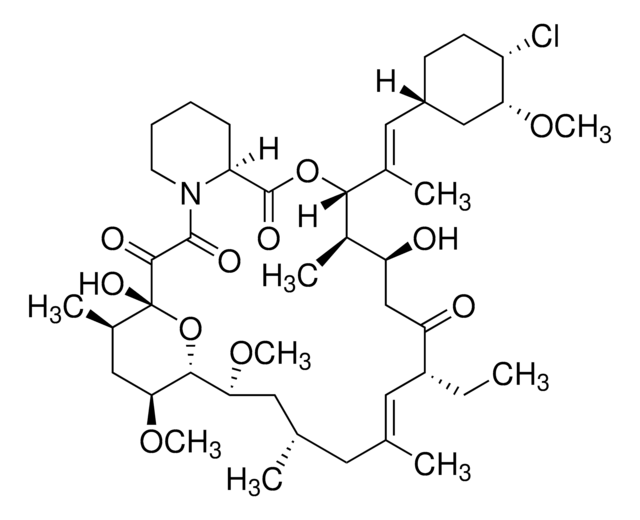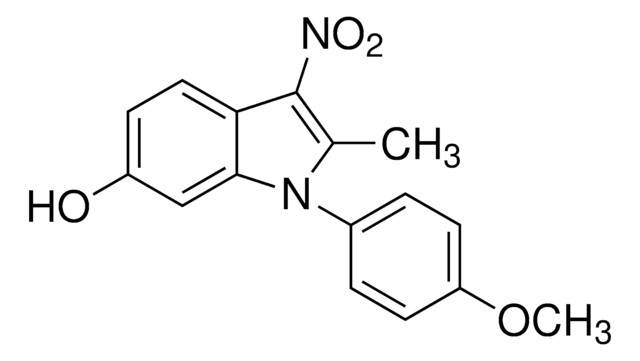1642802
USP
Tacrolimus
United States Pharmacopeia (USP) Reference Standard
Synonym(s):
FK-506 monohydrate, Tacrolimus
About This Item
Recommended Products
grade
pharmaceutical primary standard
API family
tacrolimus
manufacturer/tradename
USP
application(s)
pharmaceutical (small molecule)
format
neat
SMILES string
O.CO[C@@H]1C[C@@H](CC[C@H]1O)\C=C(/C)[C@H]2OC(=O)[C@@H]3CCCCN3C(=O)C(=O)[C@]4(O)O[C@H]([C@H](C[C@@H](C)C\C(C)=C\[C@@H](CC=C)C(=O)C[C@H](O)[C@H]2C)OC)[C@H](C[C@H]4C)OC
InChI
1S/C44H69NO12.H2O/c1-10-13-31-19-25(2)18-26(3)20-37(54-8)40-38(55-9)22-28(5)44(52,57-40)41(49)42(50)45-17-12-11-14-32(45)43(51)56-39(29(6)34(47)24-35(31)48)27(4)21-30-15-16-33(46)36(23-30)53-7;/h10,19,21,26,28-34,36-40,46-47,52H,1,11-18,20,22-24H2,2-9H3;1H2/b25-19+,27-21+;/t26-,28+,29+,30-,31+,32-,33+,34-,36+,37-,38-,39+,40+,44+;/m0./s1
InChI key
NWJQLQGQZSIBAF-MLAUYUEBSA-N
Gene Information
human ... FKBP1A(2280)
Looking for similar products? Visit Product Comparison Guide
General description
Application
- Tacrolimus Capsules
- Tacrolimus Compounded Oral Suspension
Biochem/physiol Actions
Analysis Note
Other Notes
related product
Signal Word
Danger
Hazard Statements
Precautionary Statements
Hazard Classifications
Acute Tox. 3 Oral
Storage Class Code
6.1C - Combustible acute toxic Cat.3 / toxic compounds or compounds which causing chronic effects
WGK
WGK 3
Flash Point(F)
Not applicable
Flash Point(C)
Not applicable
Regulatory Listings
Regulatory Listings are mainly provided for chemical products. Only limited information can be provided here for non-chemical products. No entry means none of the components are listed. It is the user’s obligation to ensure the safe and legal use of the product.
JAN Code
1642802-100MG:
1642802-150MG:
Certificates of Analysis (COA)
Search for Certificates of Analysis (COA) by entering the products Lot/Batch Number. Lot and Batch Numbers can be found on a product’s label following the words ‘Lot’ or ‘Batch’.
Already Own This Product?
Find documentation for the products that you have recently purchased in the Document Library.
Customers Also Viewed
Our team of scientists has experience in all areas of research including Life Science, Material Science, Chemical Synthesis, Chromatography, Analytical and many others.
Contact Technical Service






